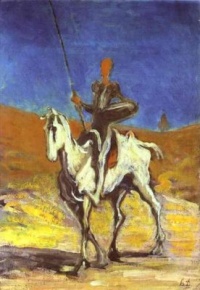Chivalry
From The Art and Popular Culture Encyclopedia
| Revision as of 23:09, 19 January 2022 Jahsonic (Talk | contribs) ← Previous diff |
Revision as of 23:09, 19 January 2022 Jahsonic (Talk | contribs) Next diff → |
||
| Line 2: | Line 2: | ||
| | style="text-align: left;" | | | style="text-align: left;" | | ||
| "The memory of these devastations, for [[Abderame]] did not spare the country or the people, was long preserved by tradition; and the invasion of France by the [[Moors]] or Mahometans affords the ground-work of those [[fables]] which have been so wildly disfigured in the romances of [[chivalry]] and so elegantly adorned by the Italian muse."--''[[The History of the Decline and Fall of the Roman Empire]]'' (1776-89) by Edward Gibbon | "The memory of these devastations, for [[Abderame]] did not spare the country or the people, was long preserved by tradition; and the invasion of France by the [[Moors]] or Mahometans affords the ground-work of those [[fables]] which have been so wildly disfigured in the romances of [[chivalry]] and so elegantly adorned by the Italian muse."--''[[The History of the Decline and Fall of the Roman Empire]]'' (1776-89) by Edward Gibbon | ||
| - | |||
| |} | |} | ||
| [[Image:Don Quixote and Sancho Pansa by Honoré Daumier.jpg|thumb|200px|right|''[[Don Quixote (Honoré Daumier, Neue Pinakothek)|Don Quixote]]'' (c. 1868) by [[Honoré Daumier]]]] | [[Image:Don Quixote and Sancho Pansa by Honoré Daumier.jpg|thumb|200px|right|''[[Don Quixote (Honoré Daumier, Neue Pinakothek)|Don Quixote]]'' (c. 1868) by [[Honoré Daumier]]]] | ||
Revision as of 23:09, 19 January 2022
|
"The memory of these devastations, for Abderame did not spare the country or the people, was long preserved by tradition; and the invasion of France by the Moors or Mahometans affords the ground-work of those fables which have been so wildly disfigured in the romances of chivalry and so elegantly adorned by the Italian muse."--The History of the Decline and Fall of the Roman Empire (1776-89) by Edward Gibbon |
|
Related e |
|
Featured: |
Chivalry is a term related to the medieval institution of knighthood which has an aristocratic military origin of individual training and service to others. It is usually associated with ideals of knightly virtues, honor and courtly love: "the source of the chivalrous idea," remarked Johan Huizinga, who devoted several chapters of The Waning of the Middle Ages to chivalry and its effects on the medieval character, "is pride aspiring to beauty, and formalized pride gives rise to a conception of honour, which is the pole of noble life."
See also
- Bors
- Bushido
- Chivalric order
- Chivalric romance
- Courtly love
- Court of Chivalry
- Domnei
- Don Quixote
- Feliciano de Silva
- Furusiyya
- Jomsvikings
- Nine Worthies
- Pas d'Armes
- Sir Lionel
- Warrior code
- Chinese knight-errant
See also


